I thought this was a bit interesting, we cant tell if its true but apparently Mihajlov confessed to it when he was in Rome.
Todor Aleksandrov
Collapse
X
-
Todor Aleksandrov
МАКЕДОНЕЦ си кога кавал ќе ти ја распара душата,зурла ќе ти го раскине срцето,кога секое влакно од кожата ќе ти се наежи кога ќе видиш шеснаесеткрако сонце,кога до коска ќе те заболи кога ќе слушнеш ПЈРМ,кога немаш ни за леб,а полн си во душата затоа што ја сакаш МАКЕДОНИЈА. МАКЕДОНИЈА во срце те носиме.Tags: None
-
-
I have heard about this probability also. I don't think it's a far stretch, while Todor Alexandrov broke the shackles of his earlier Exarchist upbringing and worked for Macedonia and the Macedonians, Mihailov turned into an opportunistic bulgarophile.In the name of the blood and the sun, the dagger and the gun, Christ protect this soldier, a lion and a Macedonian.
-
-
With all of these artices surfacing about Vanco Mihailov and his apparent stance for an independent Macedonia and against the neighbouring wolves, I am wondering wether or not this individual was a decent Macedonian at some stage, or if he was infected with bulgarophilism from the beginning to the end.
What do you think, Prolet?In the name of the blood and the sun, the dagger and the gun, Christ protect this soldier, a lion and a Macedonian.
Comment
-
-
Todor Aleksandrov: “lifelong believer in the creed of “Macedonia for the Macedonians"
TODOR ALEKSANDROV
“... A lifelong believer in the creed of “Macedonia for the Macedonians”....
“...He declares that the population will not tolerate being ruled by Serbians, Greeks, Bulgarians...”
... He has only one idea, and that is the ultimate proclamation of an autonomous Macedonia with its capital at Salonika. He declares that the population will not tolerate being ruled by Serbians, Greeks, Bulgarians, and that as the two former countries have refused to allow the people any liberty in speech or religion, only an armed struggle can bring them what they want.....”
[The London Times Jan 4 1924]
..................................
Alexandroff of Macedonia
Code of An Outlaw
(by our Special Correspondent)
This article was published originally in The Times of London on Jan. 4, 1924, several months before the assassination of Alexandroff on Aug. 31, 1924.
On The Serbo-Bulgarian Frontier.
Raiko Daskaloff, who with Stambolisky pursued a bitter campaign against the Macedonian Revolutionary Organisation, was assassinated last summer at Prague, where he had formerly been Bulgarian Minister. His assailant, Nicoloff, was afterwards tried, acquitted, and re-arrested. He was re-arrested on the grounds that he was an agent of Todor Alexandroff, the chief of the Revolutionaries. This series of events has revived interest in the activities of the Macedonians.
The present leader of the Revolutionaries is Todor Alexandroff, whom I have just visited. Whatever opinions may be held concerning the rights and wrongs of the cause he defends and the methods he employs, he and his organisation constitute an interesting study. A lifelong believer in the creed of “Macedonia for the Macedonians” and a Komita, Alexandroff took up in 1919 the leadership of the revolutionary movement. He had previously been living at Sofia, but Stambolisky had him arrested and imprisoned. His friends arranged his escape and he crossed into Macedonia, where ever since he has led a life which needs to be seen to be believed. Having decided to organise a revolutionary movement against the Serbians and Greeks who by the Peace Treaty obtained the greater part of Macedonia, Alexandroff reorganised the old Macedonian Committee, which had existed under the Turks in 1893. In the accomplishment of this task he has perforce become an outlaw, and a price of over $2,000 has been put on his head by the Serbian authorities. He leads a wandering life, dedicated to the creation of an autonomous Macedonia. Always on foot and always by night Alexandroff travels throughout Macedonia, without, however, venturing into the large towns like Salonika or Monastir. In winter he lives in some humble peasant cottage; in summer he sleeps in the open air. During the daytime he lies low. Never stopping more than two or three days in the same place, he is accompanied by a small band of devoted friends. The chief preoccupation of this band is not to enter into conflict with the Serbian or Greek authorities, but to visit and control the different committees which during the last three years have sprung up in almost every town and village.
A Born Fighter.
On being invited to visit Alexandroff I confess to having given first thought to my personal safety. In bygone days Macedonia had gained a reputation for banditry and outlawry which the Revolutionary Organization might well seem inclined to foster. But the exact contrary is now the case. By motor-car, horse, and on foot I journeyed some hundred miles over wild and mountainous country. Everywhere thriving peasantry declared that robbery and crime were things of the past. Nevertheless the time of year and the conditions of travel made me heave a sigh of relief when, one misty morning, the courier, who had remained a totally impassive figure during the whole of the journey, whispered, “Now you will see Stario” (The Old One). A minute later I met Alexandroff-a tall, strongly built man of 42 years, dressed in the dark brown uniform which has Organisation affects. A part of steely eyes and lips which in conversation can be mirthful, but which in repose are very stern; full military equipment, which he rarely takes off; a service rifle leaning against the wall; and Alexandroff began to explain to me why he led his life. He has only one idea, and that is the ultimate proclamation of an autonomous Macedonia with its capital at Salonika. He declares that the population will not tolerate being ruled by Serbians, Greeks, Bulgarians, and that as the two former countries have refused to allow the people any liberty in speech or religion, only an armed struggle can bring them what they want. Concerning his resources in munitions and men, he said that as the Macedonians object was not to annex any territory but only to make life impossible for the ruling authorities, irregular warfare was their means of struggle. Thus they did not need to have any artillery. It was on foot that they would wage their battle although mountain ponies could be used if required. They had a large supply of rifles, bombs, and ammunition, as the last few wars had led to the arming of almost every peasant.
Arms and Men.
Concerning the strength of his forces, Alexandroff claims that in Macedonia alone he can mobilise approximately 150,000 men. He pointed out, however, that the great proportion of these men were at present civilians, and that only a few thousand Komitadjis (bands of armed men) were now on a war footing. He did not refer to Macedonians outside the frontier, but it is thought that in the event of a rising many thousands now in Bulgaria would flock to his colours. When questioned as to the possible date of a revolution, he replied that circumstances were not yet altogether favourable. I took this to mean that the Organisation had not yet made all their preparations. Besides this I gathered that bigger reserves of arms and munitions were going to be accumulated. Alexandroff went on to say that he hoped that the Croats, Slovenes, and Montenegrins would in the long run discard legal for illegal methods against Serbia; a combined rising might then take place.
Asked if a compromise was not possible between the Organisation and the ruling authorities, he replied that many Serbians now resident in Macedonia realised that the present situation was extremely unsatisfactory, but that the party of Pashitch, the principal statesman in Serbia, seemed inflexible in their desire to destroy Macedonia. But, he explained, “Turkey tried to destroy us during countless years; she failed, and it is important to remember that then the considerable Turkish population was against the Revolutionary Organisation; now the Turks are with us, and I emphatically state that we are stronger than we have ever been before.” Alexandroff admitted to being in relations with Turkey, but it is easy to see that he does not place much faith on outside assistance. His is a Macedonian movement, which he hopes to bring off in conjunction with other races now forming part of the Triune Kingdom. At the same time he professed the willingness of the Organisation to submit to any impartial inquiry about the situation in Macedonia by the Great Powers, the League of Nations, or a group, of independent journalists. In addition, he stated that failing the granting of autonomy, the Organisation would welcome the placing of Macedonia under the protection of a Great Power, preferably England. As for the relations of the Organisation with Bulgaria, he rejoiced at the fall of Stambolisky and his followers, who in trying to create a Federalist Macedonian movement were the first Bulgarian Government who had ever shown themselves openly hostile to the aspirations of the Macedonian people. He characterised the Macedonian Federalists as a group of two or three hundred persons in the pay of Serbia who had no influence or importance. He emphasised that the Macedonian movement was in no way directed from Sofia and denied most categorically having been in Bulgaria or having taken part in the June coup d’Etat.
Speaking of the death of Stambolisky, he rejected the idea that his Organisation was responsible for it, but added that it was highly possible that his death had been compassed by one or more Macedonians who had grievances against him. On the other hand, he admitted that, the killing of Daskaloff, whom he described as a demagogue amongst demagogues, was the work of the Organisation. In this connection he showed me a protest which the Organisation had addressed to the Czecho-Slovak Government about the rearrest of Nicoloff, the assassin. Alexandroff considers that after Nicoloff had been once acquitted by the Czech Court of Justice there was no case against him, and that it was because the Serbian Press took up such a hostile and menacing attitude that the Czechs found a pretext for his rearrest.
Law And Morals.
Alexandroff then turned to the manner in which his Organisation was maintained and its relations with the civil population. None of his soldiers are paid. They are armed and clothed by the Organisation, and the populace give them free food and lodging. The people pay a progressive income-tax, which is exclusively devoted to the purchase of arms and clothing. They find it worth their while to support the Organisation, because, as Alexandroff significantly remarked, “the majority of the poorer peasantry do not fully understand this struggle for freedom, but one and all understand where their interests lie.” For the Organisation confers great benefits. It has its own judicial authorities, to whom, so Alexandroff states, the people appeal in preference to Serbian and Greek law courts. It has also a very strict code of morality for all its members, and immorality in action or in speech is severely punished.
Besides repressing all kinds of crime, the Organisation has introduced reforms which conduce to better all-round living conditions. It takes a keen interest in family life, and has abolished the system by which men chose the young girls who please them, afterwards making them their wives. Now each girl is free to choose the husband she likes. Relations between employer and employed are watched by the Organisation, and recently an important question relating to the tobacco industry was regulated. In a certain district the tobacco merchants were found to be paying only 70 levas a kilo to the producers, whereas the real price was about 120 levas. The Organisation stepped in and threatened the merchants, with the result that a fair price was paid and the peasantry affected became its devoted partisans.
The ownership of land is also dealt with. If a landowner decides to sell is land, the organisation insists on its being divided at a purely nominal price among the peasants who work on it. These examples of the activity of the Organisation show that assassinations and the planning of revolutions do not take up all its time. Based on democratic principles, the Organisation does not depend merely on the support of the peasants. The richer classes appreciate its existence, as formerly they hardly dared to travel about the country, so great was the risk of encountering armed bandits. Now this has been put right, and Alexandroff claims, with what would seem to be a great amount of justice, that “the Organisation is the population, and the population the Organisation.”
The Death-Warrant
So much has been said of the power of the Organisation to remove any person or persons who are hostile to its aims that it was with the greatest interest that I read a list of those condemned to death. Several had already been executed, and Alexandroff assured me that the turn of the others, would surely come. The method adopted is the same as in other secret societies. The person charged with the execution is given a certain time in which to carry out his task. If he fails, he is killed himself. The death sentence is usually preceded by at least one letter of warning, but in certain cases it is carried out immediately. The Macedonians are by nature secretive on account of the struggling existence they have led, but it is somewhat extraordinary that in the long run they never miss carrying out their vengeance. Perhaps the reason of their success lies in the exceptional form of idealism which animates the members of the Organisation. Each person has a role assigned to him or her, and the signing of a death warrant by Todor Alexandroff is the signal for the whole machine to begin its work. Orders, even the most ordinary, always go by hand. A regular chain of messengers stretches across Macedonia today. I was the witness if the working of one chain, and found it marvellously efficient. Each courier has his beat, and as he is usually a native of the region in which he travels, every nook and cranny of the ground is known to him. Sometimes the death sentence, as in the case of Daskaloff, has to be carried out abroad. If so, the unofficial representatives whom the Organisation maintains in Sofia, Constantinople, Budapest, and other European capitals are called in to play their part. The Organisation is, in fact, a vast octopus which has its tentacles stretched out over most of South-eastern Europe. Alexandroff’s ambition is that one day it will have its official representatives accredited to every European country. Still, even today there exists in the Revolutionary Organisation a factor which neither great nor small European Powers can afford to disregard.
The wintry day was drawing to a close, and it was time to take leave of Alexandroff. Some dinner, consisting of chicken and rice, washed down by linden tea, was put before us. Alexandroff ate sparingly, and soon assumed his favourite posture sitting crossed-legged, with head well back, eyes half-closed, and hands stretched forward towards the fire. An expression of grim austerity comes over his face, and to see him thus is to carry away an unforgettable impression of a very remarkable man. The whole visit seemed like a dream. Was it possible that such a Organization could exist in the twentieth century? I was quickly brought back to reality on stepping outside the house. Snow was falling, and a Komitaji band was drawn up on parade. Its leader had distinguished himself in a recent skirmish with the ruling authorities, and Alexandroff, in a short speech, presented him with the Order of Merit. The Komitas, who were all young men six feet and more high, cheered their leader and then filed silently away. A few minutes later I took my departure with my not inconsiderable bodyguard. Alexandroff saw me off, and immediately set off on a 20-kilometer march to another hamlet to continue his preaching of “Macedonian for the Macedonians.”
------------
Dats, great work in bringing the original scans to MTO!
I post the text version that has been around for over a decade on the Internet so that it can be verified and utilised when needed.
So pochit,
I.Last edited by indigen; 11-10-2010, 12:16 AM.
-
👍 1
Comment
-
-
MACEDONIAN REPRISALS. Precise Information has not yet been received of the exact circumstances in which Todor Alexandroff met his death (says Reuter in the London 'Daliy Telegraph,' under date Sofia, September 16). According to the best, authenticated account, however, . Alexandroff was killed while 'on his way to attend a revolutionary congress at some secret meeting place in the mountains. He was accompanied by two guides whom he believed to be devotedly attached to his person. Unfortunately for Alexandroff, however, his trust was misplaced. The guides had been suborned and killed their master while he was resting on the journey. His body waa subsequently found by others of his followers and buried In the Macedonian mountains, where he had made his home for so many years and where he had played so formidable a role behind the scenes in Balkan politics. While public opinion has naturally been greatly excited over the dramatc death of this Balkan Robin Hood, as he had been aptly called, there have been no disorders. The newspaper 'Slovo,' which is in close touch with Macedonian circles, says that the murder of Todor Alexandroff was the outcome of a political plot organised from the Bolshevik centre in Vienna, which has for long wished to weaken the revolutionary movement in Macedonia. The newspaper claims that Vasilleff and, Athanosoff, rival Macedonian leaders, intended to proclaim a Soviet Republic In the Petrich district on September 15th and that they had obtained financial support from foreign sources by the Intermediation of Bulgarian Communists. The Sofia correspondent of the London 'Times' under date September 16 said: According to a communication signed by General Protogueroff, one of the leaders of the Macedonian Revolutionary Organisation, Todor Alexandroff was killed by two Macedonians in the service of certain chiefs who have been recently engaged In Bolshevist propaganda. The death of Alexandroff, who was killed on August 31st, was kept secret in order to enable the Macedonian Nationalists to take in hand the direction of the revolutionary movement, and to forestall the manoeuvres of those in the service of the Bolshevists, several of whom it was decided to put to death. In accordance with this decision, Aleko Pasha and Colonel Athanasoff, who were chiefs of bands, as well as other Macedonian Communists, were killed on September 13 on the Serbian frontier by order of the Revolutionary Organisation. In Sofia Hadijimoff, a Macedonian Bolshevist, and Judge Kovatcheff, both Communist Deputies — have been assassinated by two young Macedonians, whom the police have arrested. The Government is taking measures to prevent further murders by the opposing factions of the Macedonian revolutionaries in Bulgarian territory.
(The Townsville Daily Bulletin, Saturday November 22nd 1924, page 13)
Comment
-
-
Haven't gone through this book in detail so not sure what it says about Macedonians in other sections, but it briefly touches on the subject of Aleksandrov's murder:
Eastern Europe Between the Wars, 1918-1941, By Hugh Seton-Watson. p. 314.
The alliance of the IMRO chief with the Left undoubtedly alarmed the Sofia army chiefs and nationalist politicians, besides annoying their Italian patrons. In August Aleksandrov was murdered, some believe on the instructions of Mihailov and his protector War Minister Volkov. In October of the same year Vlahov founded a seperate Macedonian movement known thenceforth as Obedineta movement, which preached federation on Communist lines. This group had the support of Macedonian communists, and was closely connected to the Bulgarian communist movement. Protogerov, who had been with Aleksandrov when he was murdered, and whom Mihailov's men had accused of complicity in the crime, inclined towards the Obedineta group. Although he never accepted a communist programme, he favoured increasingly a federalist solution of the Macedonian question. In 1928, he was murdered by Mihailov's agents.In the name of the blood and the sun, the dagger and the gun, Christ protect this soldier, a lion and a Macedonian.
Comment
-
-
Still,what should our attitude towards Alexandrov be?He's a very controversial person,at some stages of life fighting for Macedonia and Macedonians,he pushed the 'United Macedonia' idea within a Balkan federation,but also no one can deny his role in the murders of Jane Sandanski and Gorce Petrov,arguably the most prominent Macedonian heroes of the era.A very controversial figure of our history indeed.Last edited by DraganOfStip; 05-02-2012, 04:01 AM.”A people that elect corrupt politicians, imposters, thieves and traitors are not victims... but accomplices”
― George Orwell
Comment
-
-
Factional divisions and fratricide were unfortunate by-products of the Macedonian revolution, not uncommon for other peoples either. What evidence is there for his direct involvement in Sandanski's murder?In the name of the blood and the sun, the dagger and the gun, Christ protect this soldier, a lion and a Macedonian.
Comment
-
-
Actually, there is pretty accurate info about Alexandrov. DPMNE helped (Gruevski personally) publish a quite thick book with documents about and from him. It is quite clear from the docs that he was a Bulgarian nationalist, more Bulgarian then the Bulgarians themselves, very similar to Ivan Mihajlov. He used to write letters to Bulgarian PM's telling them what to do. In one letter he's practically ordering the PM to withdraw the ambassador in Prague because his wife spoke openly that Macedonians are a separate nation. Why did Macedonians flock to him? He evidently spoke only of free and united Macedonia and kept his Bulgarian nationalism hidden - something like Ljubco Georgievski today.Originally posted by Soldier of Macedon View PostFactional divisions and fratricide were unfortunate by-products of the Macedonian revolution, not uncommon for other peoples either. What evidence is there for his direct involvement in Sandanski's murder?
Comment
-
-
Mango, we both know that there are even Macedonians from the 'left' faction who shared such a sentiment at one point or another. I put most of this down to Exarchate propaganda, that is the garbage they were brought up with, that is how they were schooled. I would never place Aleksandrov in the same basket as an opportunist dog like Georgievski, but that is just my opinion. I understand others feel differently, and that's fair enough. I would be really interested to see these documents you've made reference to. What is the book called, and how do we obtain a copy?In the name of the blood and the sun, the dagger and the gun, Christ protect this soldier, a lion and a Macedonian.
Comment
-
-
Well,both Bulgarian and Macedonian Wikipedia page about Sandanski claim the involvement of the Nevrokop detachment of VMRO (at the time VMRO was led by Todor Aleksandrov),specifically the cheta of the local vojvoda Stojan Filipov with the executor being a certain Andon Kacharkov.The Macedonian one quotes the reference of the book "For freedom and perfection. The Life of Yané Sandansky" by Mercia MacDermott,and the Bulgarian one quotes Николов, Борис Й. "Вътрешна македоно-одринска революционна организация. Войводи и ръководители (1893-1934)".So,even if Aleksandrov didn't order his death directly (the above sources claim Ferdinand Koburshki of Bulgaria did,he only used VMRO of Aleksandrov as the instrument),it couldn't be done without his knowledge and approval.But all sources agree that it was Ferdinand who ordered Sandanski's death because Jane was plotting to assassinate him,he cunningly used the hatred between Sandanski (as a "lefty") and Aleksandrov (as the "authonomist") to get him killed.Originally posted by Soldier of Macedon View PostFactional divisions and fratricide were unfortunate by-products of the Macedonian revolution, not uncommon for other peoples either. What evidence is there for his direct involvement in Sandanski's murder?Last edited by DraganOfStip; 04-30-2012, 12:17 PM.”A people that elect corrupt politicians, imposters, thieves and traitors are not victims... but accomplices”
― George Orwell
Comment
-



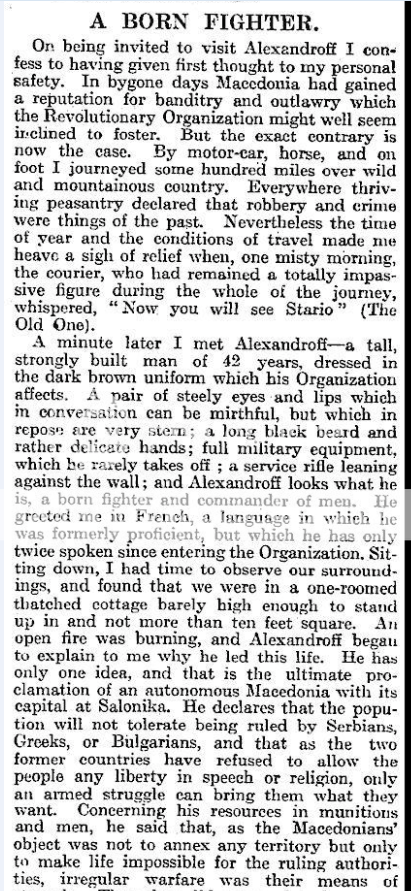


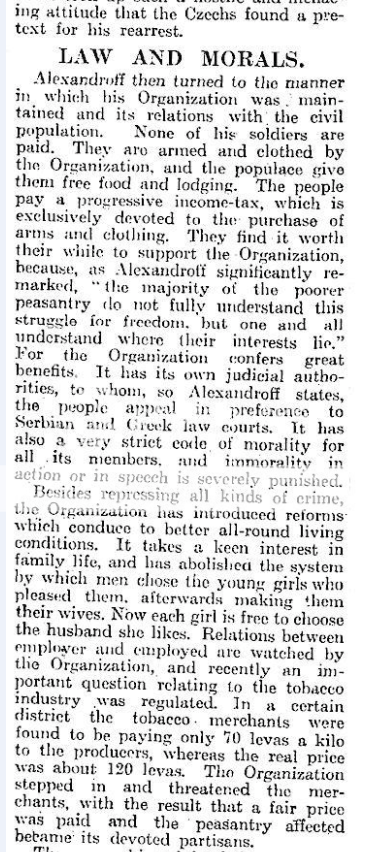
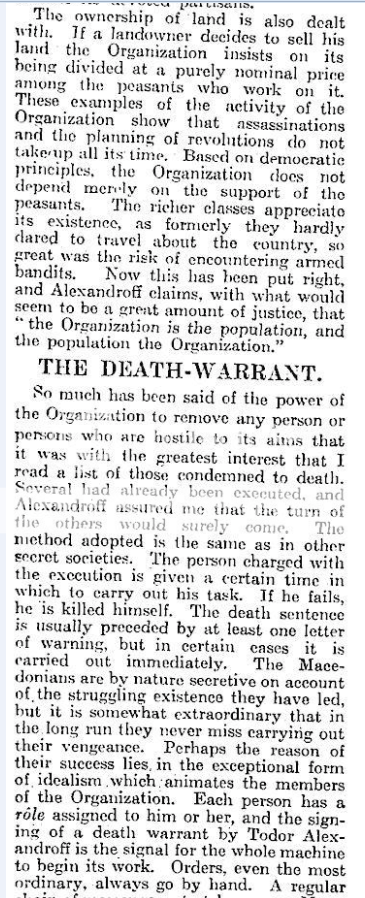



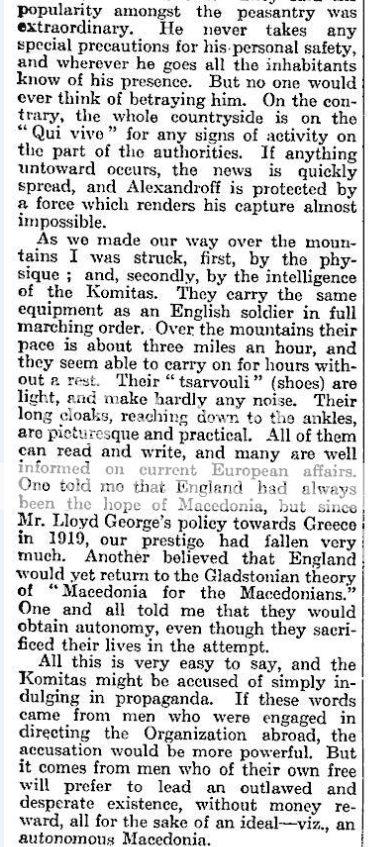
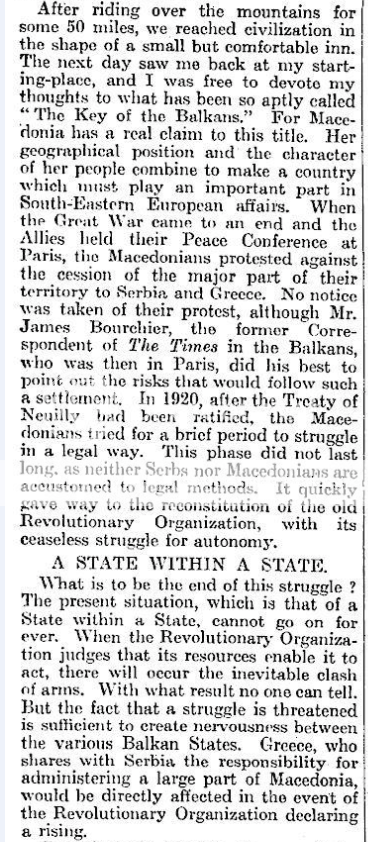
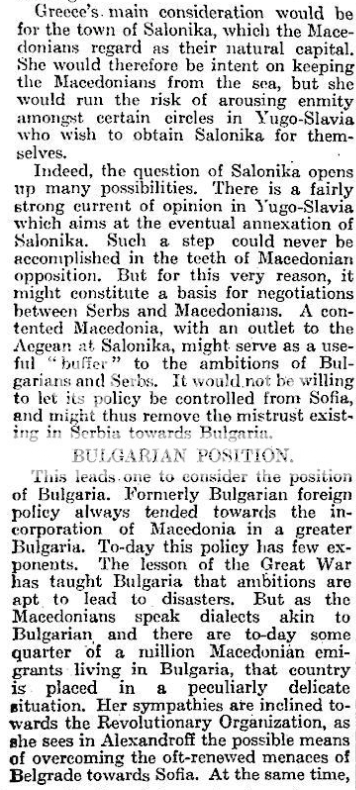




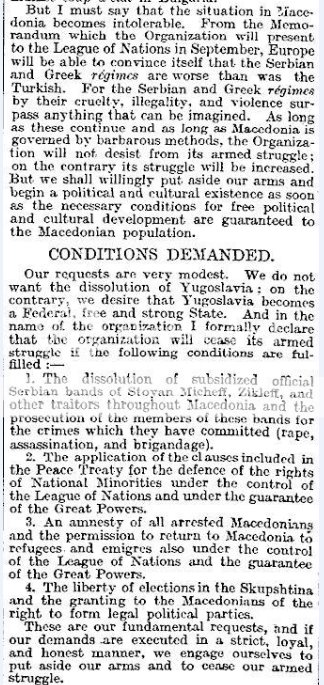
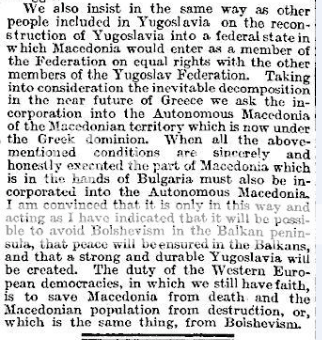
Comment